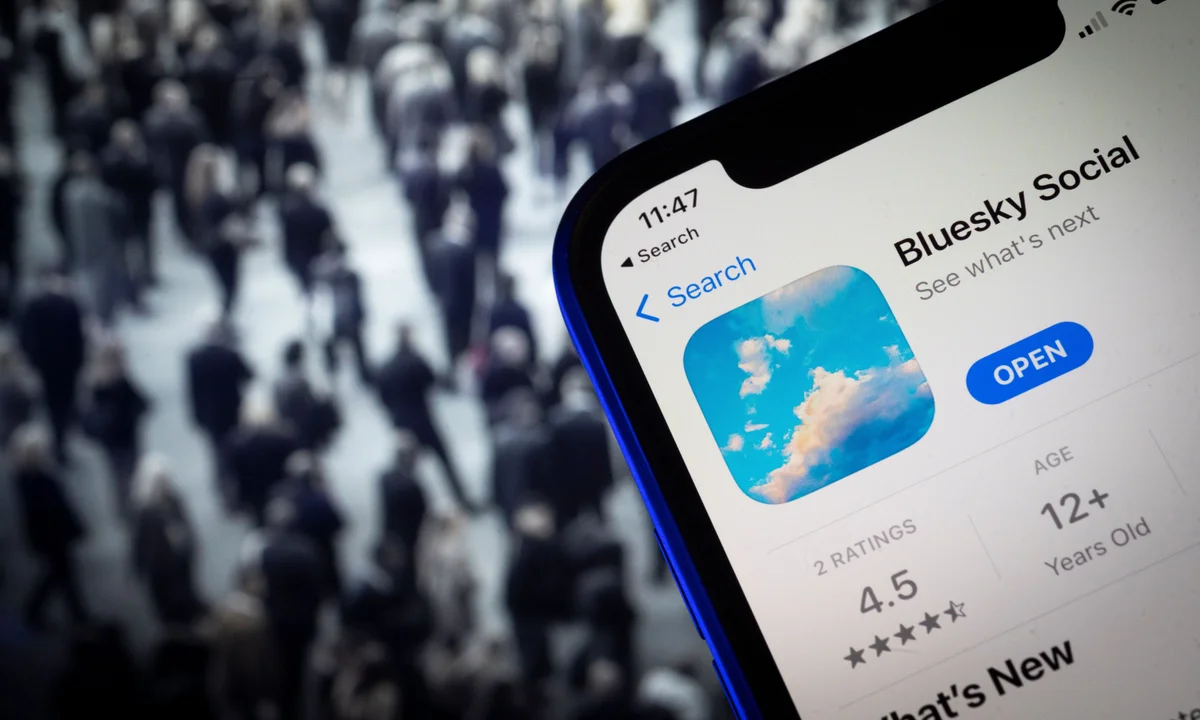Is BlueSky the new Twitter, and if so is that a good thing?

After deciding to write about Bluesky and its recent meteoric growth, I wrote down the headline above, and then I went to look at what I had written in the past about Bluesky while I was at the Columbia Journalism Review (where I was the chief digital writer until recently). And what did I find but a piece I wrote in May of last year with the identical headline :-) Two things we can learn from this, I think: 1) I lack imagination when it comes to headlines, and 2) the question about Bluesky and whether it has staying power, and what its future might look like, has been around for awhile now. I thought about changing the headline on this piece, but then I decided against it — I still think both are valid questions, and if anything they might be even more critical at this point.
Note: In case you are a first-time reader, or you forgot that you signed up for this newsletter, this is The Torment Nexus. You can find out more about me and this newsletter in this post. This newsletter survives solely on your contributions, so please sign up for a paying subscription or visit my Patreon, which you can find here. I also publish a daily email newsletter of odd or interesting links called When The Going Gets Weird, which is here.
The news hook here is that Bluesky's user base has been climbing rapidly following the election of a certain inveterate liar with multiple fraud convictions and two impeachments as president of the United States, and the corresponding rise of his lieutenant and chief booster, Elon "Dark MAGA" Musk. Perhaps it was the continued slide into right-wing mania, or the way that Musk used the network as his personal hype machine for Trump — along with the $200 million or so that he sank into Trump's campaign via a super-PAC. In any case, Bluesky has been adding literally hundreds of thousands of users every day — The Verge reported on November 11 that users had grown by 700,000 and the next day, the New York Times said it had grown by a million (you can see a live user counter here).
I have seen this happen from my own perspective, as someone who has had an account for over a year now. I don't recall the exact number of followers I had prior to the election, but I know it was below a thousand — likely in the 600 range. It is now over 2,300 and every time I check the app it says dozens more have followed me. Some I've been connected with on Twitter for a long time, but many are completely unknown to me. According to Clearsky, I am on about 30 lists, or what Bluesky calls "starter packs," so that probably explains it (my favourite list is the one that some user named "not porn"). Here's a graph that shows Bluesky's user growth since early this year, which I found here — it begins in February, which is when Bluesky opened to the public.

The network now has more than doubled since then and now has about 15 million users. Will this hockey-stick growth continue? Who knows. I certainly don't, so if you came here to find the answer to that question, you are out of luck. That said, there is a certain thing called momentum, as there is in the stock market ("there is a tide in the affairs of men," as Shakespeare put it) and so things that are going up tend to keep going up, unless acted upon by an external force — also, the Swifties have arrived, and that is no small thing. So unless Bluesky makes a massive error of some kind, more people are likely to join, and the more people who join, the more likely that others will join (Bluesky has seen periods of sharp growth before, including after Musk said Twitter would change its approach to blocking, and after Twitter was briefly banned in Brazil).
As my friend Mike Masnick wrote at Techdirt in October, it's difficult to know exactly what it is about a new social network that will "click" with new users and make them recurring users. Mike has written in the past about "disillusion events" that get users of other networks like Twitter to consider leaving, like the change in the blocking process at X, and how those need to be followed by "events that trigger lasting value" in order for people to stick around. Bluesky has a number of features that new users have mentioned as being interesting and/or useful, including the ability to sample different sorting algorithms — such as Popular with Friends, Catch Up, and Quiet Posters — rather than being restricted to a single one chosen by Meta or Twitter.
As a user, I have to say that I enjoy being able to choose from different algorithms. But the main difference for me in using Bluesky has been a lack of interaction compared with Twitter, where I have about 83,000 followers (although many are undoubtedly bots). Most tweets get at least some interaction, but on Bluesky I have posted multiple things that got zero interaction as far as I could tell (not that I'm addicted to that little dopamine hit when someone retweets or likes, no sir, not me). This is by design, people have told me, since many users don't use the sorting algorithms. As a result, the culture of Bluesky is more accepting of users reposting the same tweets or "skeets" multiple times (if this isn't the case, please let me know!).
Mike Masnick has written in more depth at Techdirt about some of the other differences about Bluesky and how it works under the hood, with one of the main ones being the separation of the "moderation layer," which just means that anyone can create a moderation system — to exclude movie spoilers, or images without alt text, etc. — and then users can choose whether to use one or more of those systems. I should also probably mention that the creation of Bluesky, which former Twitter CEO Jack Dorsey started as a kind of skunkworks project at Twitter, came from a paper that Mike wrote in 2019 called Protocols Not Platforms, which I encourage you to read if you really want to understand the ethos behind Bluesky and other similar ventures. In a nutshell, the idea is that users should be able to choose from a federated marketplace of protocols rather than being locked into a specific platform.

Dorsey is no longer involved in Bluesky, which was spun off from Twitter after Musk bought the company. Dorsey left the Bluesky board in May, and around the same time donated cryptocurrency worth about $5 million to a distributed social app called Nostr, which is based on public-key cryptography. “Don’t depend on corporations to grant you rights,” Dorsey tweeted. “Defend them yourself using freedom technology." On a related note, not everyone who loves freedom loves Bluesky — Cory Doctorow, an author and open-systems activist with the Electronic Frontier Foundation (who coined the term "enshittification"), has said that he refuses to put his content on Bluesky because it is not interoperable with other services and he wouldn't be able to move his account and connections if management had a change of heart. (Note: The original version of this post described Cory's opposition to Bluesky in what he felt was an inaccurate way and so I have changed it to make it more accurate).
Some are also concerned about the fact that Bluesky is controlled by a private corporation, run by CEO and co-founder Jay Graber. Graber (whose given name is Lantian, which means "blue sky" in Mandarin) is a former crypto developer, and one of Bluesky's primary backers is a crypto fund called Blockchain Capital. In a note about a recent funding round, Bluesky promised that Blockchain Capital's involvement did not change anything, that the Bluesky app and the AT Protocol "do not use blockchains or cryptocurrency, and we will not hyperfinancialize the social experience (through tokens, crypto trading, NFTs, etc.)." No doubt that will come as good news to some. But can this promise last? Doctorow's comments about why he won't use Bluesky are relevant enough I think it is worth quoting them at length:
I would like to use Bluesky. They’ve done a bunch of seriously interesting technical work on moderation and ranking that I truly admire, and I’ve got lots of friends there who really enjoy it. But I’m not on Bluesky and I don’t have any plans to join it anytime soon. I wrote about this in 2023: I will never again devote my energies to building up an audience on a platform whose management can sever my relationship to that audience at will. When a platform can hold the people you care about or rely upon hostage — when it can credibly threaten you with disconnection and exile — that platform can abuse you in lots of ways without losing your business. In other words, they can enshittify their service
I appreciate that the CEO of Bluesky, Jay Graber, has evinced her sincere intention never to enshittify Bluesky and I believe she is totally sincere: But here’s the thing: all those other platforms, the ones where I unwisely allowed myself to get locked in, where today I find myself trapped by the professional, personal and political costs of leaving them, they were all started by people who swore they’d never sell out. Bluesky lacks the one federated feature that is absolutely necessary for me to trust it: the ability to leave Bluesky and go to another host and continue to talk to the people I’ve entered into community with there.

I think it's safe to say that a number of users who have been down this road before are concerned about the involvement not just of a private equity funder, but one whose primary business is cryptocurrency, something that many people seem to see as shady or questionable in some way — if not an outright scam. The idea that a social network into which you pour a lot of your online activity and thought might one day be diverted to become a rug-pull crypto operation probably doesn't fill anyone with good feeling.
I have no doubt that, as Cory says, Graber and the other founders of Bluesky are sincere in their desire to build an open service with a federated protocol, etc. But history has shown time and again that economic interests often interfere with the best efforts of founders. For what it's worth, Masnick argues that the way Bluesky is built makes it less likely that it will be "enshittified" by its owners, since anyone could just duplicate it, using the same protocol, and run their own while extracting all of the users and their activity from the original.
No discussion of Bluesky would be complete without mentioning the elephant in the room — not Twitter (which is more of a chupacabra in the room), but Threads. According to Mark Zuckerberg's most recent financial presentation, the network now has about 275 million users, which is more than ten times what Bluesky has. But while Threads has lots of users, as digital-media veteran Peter Kafka noted in a recent piece for Business Insider, it often doesn't feel that way when you are on there (although he noted that this was not based on hard numbers but was "more of a vibes thing." I can confirm that it often seems like a bit of a ghost town.
As more than one person has noted, Threads was also almost completely useless during the election, because of Threads' longstanding position against using the service to share news, and particularly political news. This has been around since Threads launched with much fanfare in July 2023, gaining more than thirty million users in just 24 hours. Even as Meta was revelling in this tidal wave of interest, there was controversy over comments made by Threads chief Adam Mosseri, who said that while users were free to post and discuss news and politics, Threads was “not going to do anything to encourage” that kind of content. Mosseri said this policy was consistent with Meta's approach to political content on Facebook and Instagram, as outlined in a post.
As Casey Newton described in his Platformers newsletter, the policy has bitten more than one journalist on Threads. The Washington Post’s Will Oremus said he was “about done with this platform” after Threads removed one of his posts that linked to a Substack piece analyzing election results. (It was later restored.) “This is the fourth time in a month I’ve been blocked from posting links to journalism for absolutely no defensible reason,” Oremus wrote. “Literally all my post said was ‘some helpful context’ and linked to an essay that compared last night’s election results to recent outcomes in the UK, France and Germany.” The Threads policy seemed odd at the best of times, but it certainly became a lightning rod for criticism as the election drew closer.

I haven't mentioned Mastodon and the "fediverse" because that's probably a whole column on its own (I wrote about it for CJR earlier this year when Meta started following through on its commitment to plug Threads into the fediverse in a limited way). I do think Mastodon has a number of good things going for it, including the ability to connect other apps and services to it — like Ghost, which I use to publish this newsletter — via the ActivityPub protocol (which is similar to but not yet compatible with Bluesky's AT protocol). So it's relatively easy to take a WordPress blog, for example, and turn on an ActivityPub plugin and make that blog part of the fediverse, so that others can follow it through the platform or app of their choice. Meta seems committed to federation, and that could help Threads expand further, especially in the nerdiverse (in my experience at least, Mastodon seems to appeal primarily to nerds and geeks -- not that there's anything wrong with that! I am a nerd/geek myself).
In the short term at least, it seems as though we could have three or four competing social networks: one, Twitter/X, is the place for right-wing Musk fans and tech bros and Trump supporters (and journalists and others who need to be there for work); Bluesky is the place for that early Twitter anything-goes vibe plus journalists and real-time news; Mastodon is the place for nerds and geeks and others who like the nuts-and-bolts of social tech; and Threads is... well, Threads is whatever is left over after all of those other things are removed :-) And that's why tools like Micro.blog and Openvibe will continue to be popular, since they allow people to post to multiple unconnected networks from a single app (which reminds me of the bad old days when people needed something like Trillian to follow people on IM apps like AOL Instant Messenger and MSN Messenger and Google Talk, or whatever it was called back then.
And so we come back to the question of whether Bluesky is the new Twitter, and if that's a good thing or not. It definitely feels like the new Twitter, in the sense of the old Twitter — before Musk, and even before Dorsey. It has an energy to it. It has good vibes (Ryan Broderick of Garbage Day says it's the new Twitter). That's not to say it will become the new Twitter in the sense of becoming what Twitter is now, but then that's probably a very good thing. And if Masnick and others are right, maybe we don't actually need a new Twitter in either sense — what we need are tools that let us connect the apps and services we use to each other, so that we can see what is happening in each, and use our own tools to craft an experience that suits us, rather than being a captive audience for the tools and experiences that others create (and monetize).
There will always be those who don't care about crafting their own experiences, of course, who are willing to take whatever is given to them. Some like to watch Netflix, and others like to run a Plex server and do their own content curation. Are there more of the latter than there are of the former? Again, who knows. But perhaps there is a way for all of us to get the experience we want, without having to deprive others of theirs. If Bluesky can help do that, then I'm all for it.

Got any thoughts or comments? Feel free to either leave them here, or post them on Substack or on my website, or you can also reach me on Twitter, Threads, BlueSky or Mastodon. And thanks for being a reader.



